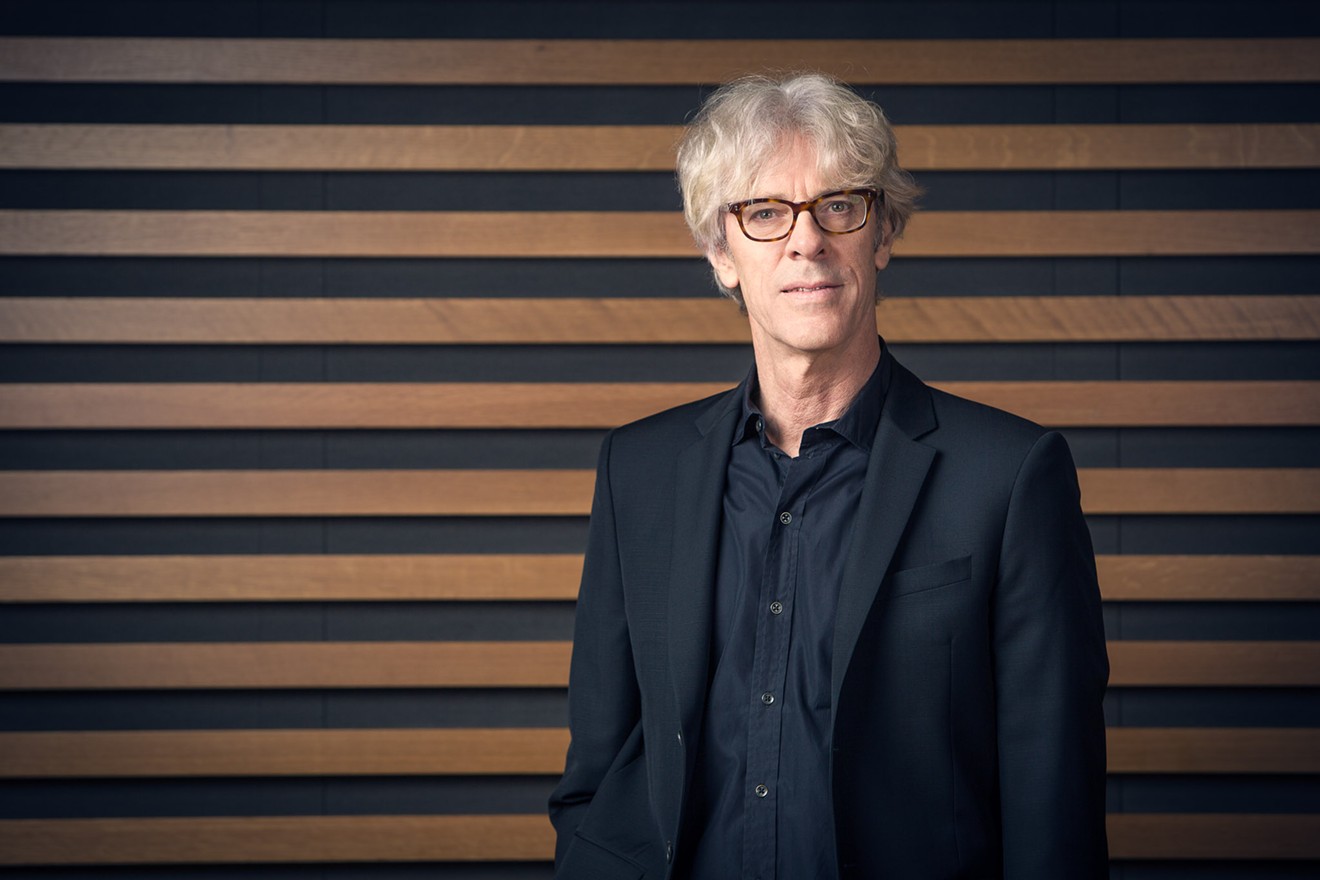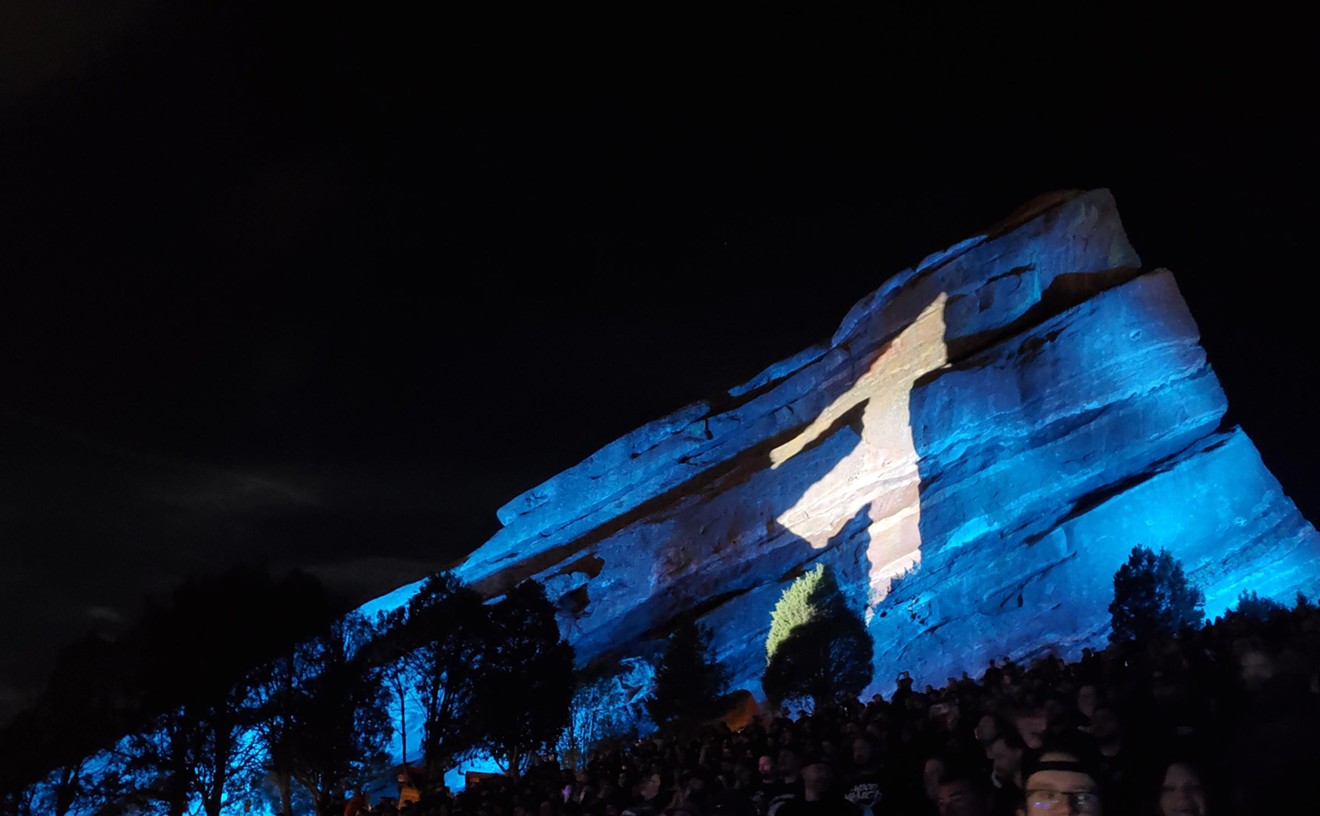Stewart Copeland, drummer and co-founder of the Police, wants people to know that if they see him and the Colorado Symphony perform Tyrant’s Crush, his concerto for trap set and orchestra, this weekend, that “they can make as much noise as they want. This ain’t Mahler.”
Tyrant’s Crush, Copeland's first concerto, tells the story of a dictator, based on figures like Mohammar Gaddafi, Idi Amin and Saddam Hussein. According to Copeland's program notes, the first movement, “Poltroons in Paradise,” is "the cheerful part of the story, about those who ride in on the back of a revolution and then discover the temptation of things against which they had revolted.”
Copeland says the second movement is much quieter: “The old dictator is sitting at his desk, trying to figure this shit out. And the rats are eating at the ropes and the pipes are leaking, and everybody who knows how to run this shit is in jail. And that’s a more contemplative movement.”
The third movement, he continues, is “Let's blow the whole place up. That’s where we all go ape, bananas crazy.”
Colorado Symphony Music Director Designate Brett Mitchell says when he was studying the score of Tyrant’s Crush, he thought the piece was really fun.
“I don’t know how many concertos there are in the world for drum set and orchestra, but let’s safely assume that [it's] not as many as, for example, violin and orchestra," Mitchell says.
“This is definitely something that’s a little more outside the box, which is something that we do at the Colorado Symphony better than just about anybody in the business," he adds. "This is such an open-minded orchestra. To have the opportunity to play a piece of Stewart’s with Stewart — I mean, the whole experience, even before you crack open the score, already promises all this fun. And then you actually get into the music, and you’re like, ‘Oh, awesome, the music is actually really fun, too.’”
Mitchell says that Copeland has a great command of the orchestra, and he highlights the entire ensemble as well as the percussion section. “The writing is very idiomatic,” Mitchell adds. “I think the musicians are going to enjoy playing it and find it not terribly difficult, which is really helpful for a new piece like this.”
Copeland notes that the challenge of performing with an orchestra is paying attention to the dynamics, because the dynamic range of the orchestra is far wider than the drums.
“With all of the guys blazing away at full force, that’s a fair fight between the drum set and the orchestra," he explains. "But that beautiful little poignant oboe melody that I’m so fond of, that I wrote in a moment of bittersweet torment — I like the folks to hear that. But I’m banging away on the drums, so I’ve got to play real quiet. And I actually learned how to accompany a solo violin or a solo oboe or English horn on the drums, which takes a very, very different, light touch and a completely different technique from blazing away up against 200 watts of Marshalls on either side of me and a bazillion-watt PA.
“The dynamic range of a rock band goes from — on the drums — it goes from seven to twelve. An orchestra goes from zero to four. But interestingly, the fact is it's oddly more powerful. The orchestra is so much quieter than a rock band. You don’t notice when you’re in the concert hall with an orchestra in front of you. It feels louder because it’s more dramatic. There’s more sonority, and you feel the textures of weight. So it feels loud. But if...in the middle of your Mahler symphony, somebody walks out with a Fender Champ and a guitar, it’ll just blow the whole thing away. You’ll go, ‘Wow!’”
Before Copeland began composing orchestral and opera works, he spent more than three decades composing music for film. The same year the Police released 1983’s Synchronicity, the trio’s final studio album, Copeland started work on his first film score, for Francis Ford Coppola’s Rumble Fish. While being hailed as one of the best drummers in rock history, he was feeling his way through the film-scoring process and had a revelation while working with a string section and how different it was from playing with a rock band.
“When a guitarist comes in, you book him for the afternoon,” Copeland says. “The guitarist brings his amp and his twenty guitars, and you play him a track and you talk about it – ‘this kind of vibe, you know, like a Ry Cooder kind of thing, or a Jimi Hendrix kind of thing, and you talk guitar-ese to him. And you spend a glorious, fun afternoon with a great player. It’s one of my favorite ways of spending an afternoon.
“But the strings guys come in, and the chart’s there. I start talking to them, and I show them a scene, and I’m chatting to them about it, and they’re looking more and more uncomfortable. Instead of bonding with these players, they’re looking more and more uncomfortable. So, finally, one of them says, ‘Maestro, do you want us to play what’s on the page here, or whatever the fuck you’re talking about?’”
Copeland told them to play what’s written on the page; they ran through cue after cue, and within an hour, they were finished. That was a revelation for Copeland. Instead of having to rehearse with a rock band for hours and hours, hashing out ideas, Copeland could just write it all down on staff paper, hand it to musicians and have them play it.
“And that’s where the journey began — or, rather, it resumed,” Copeland says. “The rediscovery of music on the page and the magic that can be created if you do your homework. In a band, it’s all about thinking on your feet, improvising. And you collaborate. You throw ideas back and forth, and you’re thinking on your feet. In orchestral music, it’s all about the homework.”
For the next three-plus decades, Copeland would go on to score dozens of films and TV shows before retiring from film composing around the same time the Police reunited for a tour in 2007. Copeland says that while working in film, he’d hire people to orchestrate string parts for him. Over the years, he gradually started “taking more and more of an interest in putting more and more pencil on these scores that I’m doing but never really had a chance to go orchestrate it myself because I got other fish to fry.”
After retiring from the film business, Copeland had time to hire someone to teach him how to orchestrate. He says he had the music, he just wanted to put it on the page himself and communicate with the sixty players in an orchestra, and he wanted to know the language that the musicians knew so that he could speak to them directly and get what he wanted.
Along the way, he learned how to use the different groups of the orchestra to best effect and spent time studying scores of John Williams (“The first page of Star Wars is a college degree,” Copeland says), as well as Igor Stravinsky and Maurice Ravel, both of whom have pieces on this Saturday’s program with the symphony, in addition to John Adams.
“That is the best program that I’ve ever played, by the way,” Copeland says. “That is the best programming. That is fantastic programming.”
Mitchell, who programmed the concert and will conduct on Saturday, says that the influence of those three composers is strong. “I think that on the first half, you’ll hear John Adams’s Chairman Dances and you’ll hear the Stravinsky Pulcinella,” Mitchell says. “And I think that once you’ve heard those two pieces, you’ll come back and you’ll listen to Stewart’s concerto with some very new ears, and you’ll realize, ‘Oh, my God, these worlds aren’t as far apart as I thought they were.’”
Mitchell thinks there will be a lot of fans of the Police in the audience who will open up for the first time to composers like Adams, Stravinsky and Ravel after thinking that classical composers could never speak on the same level as somebody like Copeland.
“And I also think,” Mitchell adds, “that there are going to be a good number of people who are going to come to the concert because of the Adams and Stravinsky and because of the Ravel and are going to hear Stewart’s piece and say, ‘Oh, isn’t that interesting. I thought this guy was in the pop world and just did pop stuff.’ But this is legit, awesome, contemporary, badass classical music. And so I think that it’s going to open ears on both sides — and that’s really what we’re all about at the Colorado Symphony.”
Stewart Copeland and the Colorado Symphony perform at 7:30 p.m. on Saturday, February 25, in Boettcher Concert Hall; tickets cost $29-$89. Find more information at coloradosymphony.org.
[
{
"name": "Air - MediumRectangle - Inline Content - Mobile Display Size",
"component": "12017618",
"insertPoint": "2",
"requiredCountToDisplay": "2"
},{
"name": "Editor Picks",
"component": "17242653",
"insertPoint": "4",
"requiredCountToDisplay": "1"
},{
"name": "Inline Links",
"component": "18838239",
"insertPoint": "8th",
"startingPoint": 8,
"requiredCountToDisplay": "7",
"maxInsertions": 25
},{
"name": "Air - MediumRectangle - Combo - Inline Content",
"component": "17261320",
"insertPoint": "8th",
"startingPoint": 8,
"requiredCountToDisplay": "7",
"maxInsertions": 25
},{
"name": "Inline Links",
"component": "18838239",
"insertPoint": "8th",
"startingPoint": 12,
"requiredCountToDisplay": "11",
"maxInsertions": 25
},{
"name": "Air - Leaderboard Tower - Combo - Inline Content",
"component": "17261321",
"insertPoint": "8th",
"startingPoint": 12,
"requiredCountToDisplay": "11",
"maxInsertions": 25
}
]












